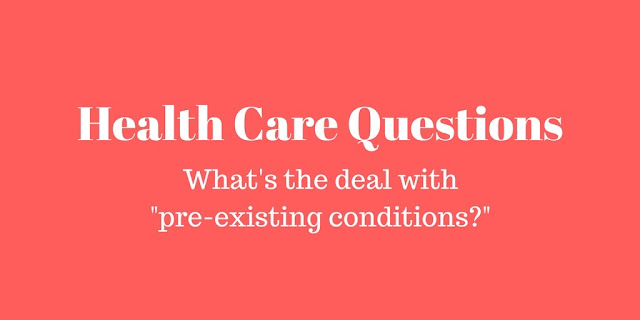Tuesday, June 20, 2017
Health Care Questions: What's the deal with "Pre-Existing Conditions?"
Over the next several days, the NCC Blog will attempt to answer some basic questions about the current health care debate, especially as it relates to people with disabilities.
Read the first post here: "What's going on? And why?"
The next question is ...
What's the deal with "Pre-existing Conditions?"
You hear a lot about "pre-existing conditions" in all the recent news about health care. So what is it everyone is talking about?
• Pre-existing conditions are medical conditions a person has ... or had ... before signing up for health insurance.
• This is relevant to people with disabilities, because often, disabilities are pre-existing conditions. If you have had M.S., or paraplegia, or Down Syndrome, or some other disability before signing up for a new health insurance policy, the company will probably regard it as a pre-existing condition.
• Until recently, health insurance companies often refused to cover people with pre-existing conditions, or else charged them much higher premiums. The main reason for this is that they consider people who have been sick, or who have significant disabilities, as likely to cost a lot more in health care than "healthy" people. Many, if not most disabled people will cost more in health care than they will ever pay in health insurance premiums.
• Under the Affordable Care Act, (ACA, a.k.a.: Obamacare), health insurance companies are no longer allowed to refuse to cover people with pre-existing conditions, or charge them more for health insurance.
• The House's American Health Care Act, (AHCA), Includes an amendment that would not outright reverse this policy, but it would allow states to apply for a waiver, allowing them to permit insurance companies to charge higher premiums to people with pre-existing conditions.
This sounds complicated! What's it actually mean?
It means that if the AHCA passes, some states might allow insurance companies to go back to their older exclusionary practices, making it harder ... more expensive ... or impossible for people with disabilities to buy health insurance on the open market. This would probably affect people with disabilities:
• With moderate incomes ... lower income people usually qualify for Medicaid.
• Who are young people leaving their parents' insurance.
• Who are either unemployed or in entry-level jobs that don't include group health insurance.
• Who lose their private insurance, but can't qualify for either Medicaid or Medicare.
The House bill also includes something called "high risk pools," which would directly fund health insurance for people with pre-existing conditions who are shut out. The problem is that historically, high risk pools have been under-funded, and they are extremely vulnerable to budget cuts and neglect.
Most people with disabilities don't fit neatly into secure, generous benefits programs. Most of us at one time or another fall between the cracks. Yet, most of us can't afford to go without health insurance, even for a few weeks. Tinkering with the pre-existing condition rules, even without fully repealing them, is a very risky thing to do, and the consequences are potentially enormous.
Further reading:
How the GOP Health Bill Affects Sick People
Olga Khazan, The Atlantic - May 4, 2017
Here's what you need to know about preexisting conditions in the GOP health care plan
Glenn Kessler, Washington Post - May 4, 2017
Does new version of the AHCA protect coverage for pre-existing conditions?
Will Doran, PolitiFact - May 4, 2017
The CBO Says Trumpcare Won’t Cover Everybody With Pre-Existing Conditions
Ben Mathis-Lilley, Slate.com - May 24, 2017
Labels:
Information,
Policy
Subscribe to:
Post Comments (Atom)


No comments:
Post a Comment